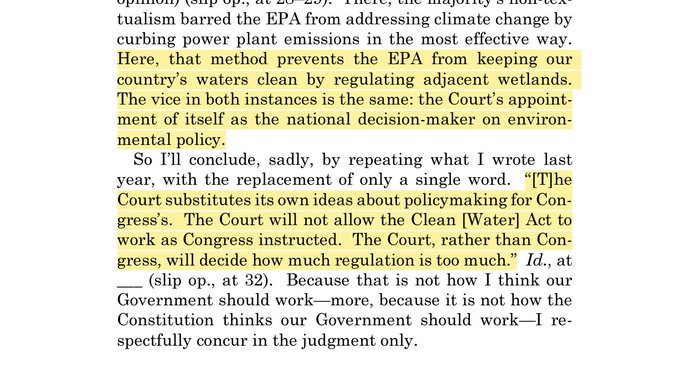‘Big Win for Polluters’: U.S. Supreme Court Delivers Blow to Wetlands Protections
Thursday’s decision in Sackett v. the U.S. Environmental Protection Agency “dramatically narrows” which wetlands are covered by the Clean Water Act.
By
Common Dreams

Miss a day, miss a lot. Subscribe to The Defender's Top News of the Day. It's free.
By Jessica Corbett
The U.S. Supreme Court on Thursday severely curtailed protections for “waters of the United States.”
The decision in Sackett v. the U.S. Environmental Protection Agency (EPA) is “unanimous in result but very split in reasoning,” explained Slate’s Mark Joseph Stern. “The upshot of Sackett is that, by a 5–4 vote, the Supreme Court dramatically narrows” which wetlands are covered by the Clean Water Act.
The majority opinion — authored by Justice Samuel Alito and joined by all of the court’s other right-wing members except Justice Brett Kavanaugh — concludes that the Clean Water Act only applies to wetlands with “a continuous surface connection” to larger bodies of water, excluding those that are “adjacent.”

Cristian Farias
@cristianafarias
·
Follow
Five members of the Supreme Court dealt a crushing blow to the Clean Water Act, rewriting the word "adjacent" in the law to mean "adjoining," thus leaving unprotected from pollution, and EPA oversight, vast swaths of wetlands. https://supremecourt.gov/opinions/22pdf/21-454_4g15.pdf
Justice Elena Kagan:

9:25 AM · May 25, 2023

Read the full conversation on Twitter
Earthjustice declared in response to the ruling that “this is a catastrophic loss for water protections across the country and a win for big polluters, putting our communities, public health, and local ecosystems in danger.”
Manish Bapna, president and CEO of the Natural Resources Defense Council, was similarly critical, saying that “the Supreme Court ripped the heart out of the law we depend on to protect American waters and wetlands.”
“The majority chose to protect polluters at the expense of healthy wetlands and waterways. This decision will cause incalculable harm. Communities across the country will pay the price,” Bapna warned.
“What’s important now is to repair the damage,” he added.
Bapna said:
“The government must enforce the remaining provisions of law that protect the clean water we all rely on for drinking, swimming, fishing, irrigation, and more. States should quickly strengthen their own laws. Congress needs to act to restore protections for all our waters.”
CONTINUE HERE: https://childrenshealthdefense.org/defender/supreme-court-wetlands-protections-cd/?utm_source=luminate&utm_medium=email&utm_campaign=defender&utm_id=20230526
Thursday’s decision in Sackett v. the U.S. Environmental Protection Agency “dramatically narrows” which wetlands are covered by the Clean Water Act.
By
Common Dreams

Miss a day, miss a lot. Subscribe to The Defender's Top News of the Day. It's free.
By Jessica Corbett
The U.S. Supreme Court on Thursday severely curtailed protections for “waters of the United States.”
The decision in Sackett v. the U.S. Environmental Protection Agency (EPA) is “unanimous in result but very split in reasoning,” explained Slate’s Mark Joseph Stern. “The upshot of Sackett is that, by a 5–4 vote, the Supreme Court dramatically narrows” which wetlands are covered by the Clean Water Act.
The majority opinion — authored by Justice Samuel Alito and joined by all of the court’s other right-wing members except Justice Brett Kavanaugh — concludes that the Clean Water Act only applies to wetlands with “a continuous surface connection” to larger bodies of water, excluding those that are “adjacent.”

Cristian Farias
@cristianafarias
·
Follow
Five members of the Supreme Court dealt a crushing blow to the Clean Water Act, rewriting the word "adjacent" in the law to mean "adjoining," thus leaving unprotected from pollution, and EPA oversight, vast swaths of wetlands. https://supremecourt.gov/opinions/22pdf/21-454_4g15.pdf
Justice Elena Kagan:

9:25 AM · May 25, 2023

Read the full conversation on Twitter
Earthjustice declared in response to the ruling that “this is a catastrophic loss for water protections across the country and a win for big polluters, putting our communities, public health, and local ecosystems in danger.”
Manish Bapna, president and CEO of the Natural Resources Defense Council, was similarly critical, saying that “the Supreme Court ripped the heart out of the law we depend on to protect American waters and wetlands.”
“The majority chose to protect polluters at the expense of healthy wetlands and waterways. This decision will cause incalculable harm. Communities across the country will pay the price,” Bapna warned.
“What’s important now is to repair the damage,” he added.
Bapna said:
“The government must enforce the remaining provisions of law that protect the clean water we all rely on for drinking, swimming, fishing, irrigation, and more. States should quickly strengthen their own laws. Congress needs to act to restore protections for all our waters.”
CONTINUE HERE: https://childrenshealthdefense.org/defender/supreme-court-wetlands-protections-cd/?utm_source=luminate&utm_medium=email&utm_campaign=defender&utm_id=20230526






 Sat Mar 23, 2024 11:33 pm by globalturbo
Sat Mar 23, 2024 11:33 pm by globalturbo

